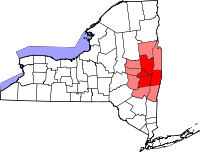Roessleville, New York
Roessleville | |
|---|---|
hamlet and CDP | |
| Etymology: for Theophilus Roessle | |
| Coordinates: 42°41′42″N 73°48′27″W / 42.69500°N 73.80750°W | |
| Country | United States |
| State | New York |
| Region | Capital District |
| County | Albany |
| Settled | 1840 |
| Area | |
| • Total | 2.89 sq mi (7.5 km2) |
| • Land | 2.88 sq mi (7.5 km2) |
| • Water | .01 sq mi (0.03 km2) |
| Elevation | 243 ft (74 m) |
| Population (2020) | |
| • Total | 11,518 |
| • Density | 4,000/sq mi (1,500/km2) |
| Time zone | UTC-5 (EST) |
| • Summer (DST) | UTC-4 (EDT) |
| ZIP Code | 12205 |
| Area code | 518 |
Roessleville is a hamlet in the town of Colonie, Albany County, New York, United States. It is a densely settled suburb of the city of Albany, along New York State Route 5. Roessleville was a census-designated place in the 1990 Census, but was deleted in 2000,[1] but became a CDP again in 2020.[2]
History
[edit]Roessleville was originally of the Pine Bush pine barrens that stretched from Albany to Schenectady; the land later became farmland in the 1940s, then more recently transformed into a densely packed suburb.[3] Roessleville is named for Theophilus Roessle, a German immigrant from the Kingdom of Württemberg, who built one of the most elegant mansions in the Albany area in what is now Roessleville; today's Elmhurst Avenue was once his gated driveway.[3][4] Two of the most famous residents of Roessleville was Josiah and Elizabeth Stanford; parents of Governor of California Leland Stanford; who moved the entire family here in 1840 and owned the Elm Grove Farm and hotel.[5]
Geography
[edit]Roessleville is that section of the town of Colonie between Osborne and Wolf roads, it is bisected by Central Avenue (NY Route 5).[3] The Albany city line is along its southeastern border, the village of Colonie is along its northwestern boundary at Wolf Road. The census-designated place of Roessleville, as defined by the US Census Bureau for 1990, was 2.9 square miles (7.5 km2) in area.[6]
Location
[edit]Demographics
[edit]| Census | Pop. | Note | %± |
|---|---|---|---|
| 1970 | 5,476 | — | |
| 1980 | 11,685 | 113.4% | |
| 1990 | 10,753 | −8.0% |
Since hamlets are by definition ill-defined any attempt at accurate calculations of population related statistics will be difficult or inaccurate. As a census-designated place (CDP) prior to 2000 however Roessleville did have definitive boundaries, though they did change over time from one census to another. Roessleville was not a CDP in 1960, but was in 1970 when it had 5,476 persons which included 125 in a small slice of the town of Guilderland;[7] the Guilderland section was not included in 1980,[8] and in 1990 Roessleville had a population of 10,753.[6]
References
[edit]- ^ 2000 census of population and housing: Population and housing unit counts, Issues 19-23. United States Bureau of the Census. 2003.
- ^ "State of New York Census Designated Places - Current/BAS20 - Data as of January 1, 2019". tigerweb.geo.census.gov. Retrieved February 24, 2020.
- ^ a b c Frances Ingraham (September 11, 1994). "Roessleville Evolved from Pine Bush, Farmland". Albany Times Union. Retrieved February 13, 2010.[permanent dead link]
- ^ George Howell and Jonathan Tenney (1886). Bi-Centennial History of Albany: History of the County of Albany from 1609-1886. W.W. Munsell and Company. p. 935. Retrieved February 10, 2010.
- ^ Schenectady County Historical Society (2009). Niskayuna. Arcadia Publishing. p. 72. ISBN 978-0-7385-6536-1. Retrieved February 13, 2010.
- ^ a b "Table 5: Land Area and Population Density: 1990" (PDF). US Bureau of the Census. p. 39. Retrieved February 13, 2010.
- ^ 1970 Population: Volume 1; Characteristics of the Population. US Census of the Bureau. 1970. p. 3423.
- ^ 1980 Census of Population; Volume 1: Characteristics of the Population. US Bureau of the Census. 1980. pp. 34–10. Retrieved February 13, 2010.


 French
French Deutsch
Deutsch

